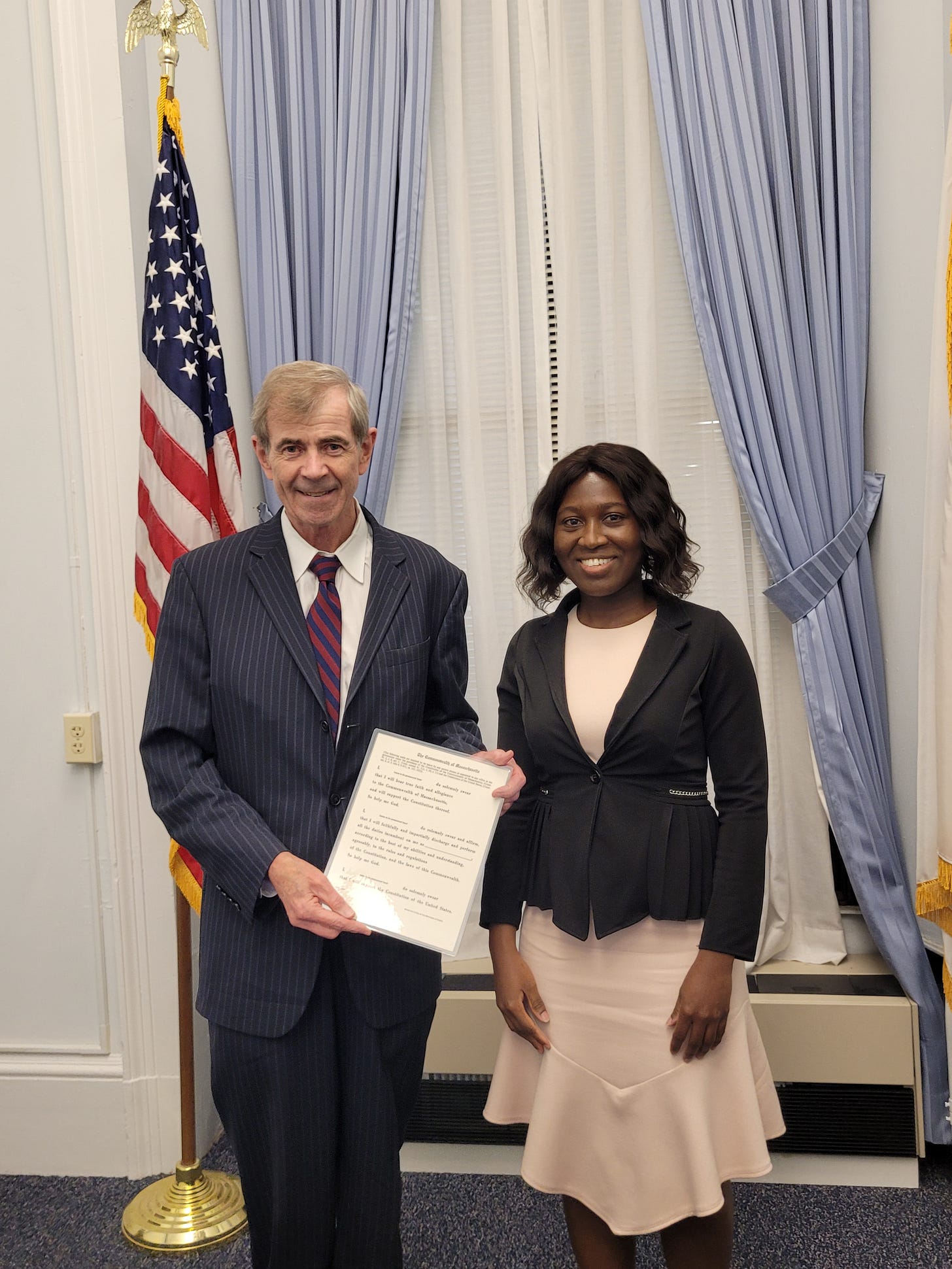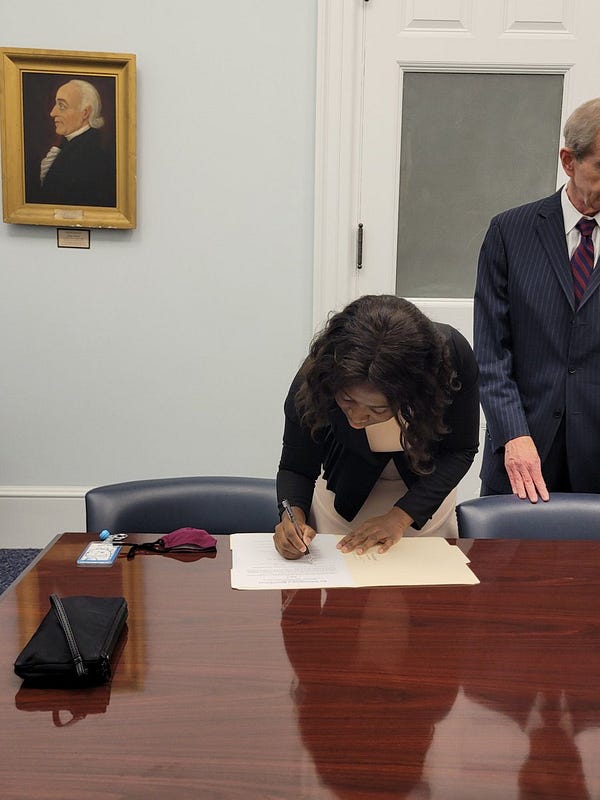Galvin appoints new supervisor of public records
Manza Arthur will serve as the commonwealth’s new public records watchdog

Hey everyone,
I’ve got a relatively short piece for once...
On Friday, Secretary of the Commonwealth William F. Galvin announced his appointment of Manza Arthur as the new supervisor of public records, the state’s public records watchdog. Arthur, who now heads the office’s Public Records Division, is responsible for deciding appeals brought by people denied access to public records.
Arthur joined the Public Records Division as a staff attorney in May 2017. She was promoted to senior attorney in 2019 and assistant director in 2021. A press release from the secretary’s office describes Arthur as an “experienced public records attorney.”
Arthur was born in Ghana, where she attended the University of Cape Coast. She immigrated to the United States in 2008, transferring to Worcester State University and graduating in 2012. She then attended Suffolk University Law School, graduating in 2016.
During the summer of 2015, she interned at the Raoul Wallenberg Institute of Human Rights and Humanitarian Law in Lund, Sweden.
“Despite my limited knowledge of the international world, as a young girl growing up in Ghana I have always been interested in International law and my interest in International human rights law has grown over the years,” she said in a 2015 essay posted on RWI’s website.
In 2016, she spent four months working as an intern at the Worcester County District Attorney’s Office. There, she “[r]esearched and drafted a legal memorandum analyzing the different standards that police officers must meet when dealing with juveniles of different ages in terms of their Miranda Rights,” according to her LinkedIn profile.
The secretary’s office declined to make Arthur available for an interview and said it would not provide a written statement from her at this time.
Arthur is still settling into her new role and plans to continue the policies of her predecessor, according to Debra O’Malley, the communications director for the secretary’s office.




Arthur replaces Rebecca Murray, who has been promoted to the office’s general counsel.
Murray, a career employee of the secretary’s office, was appointed supervisor in late December 2016, just days before a major update to the public records law took effect. She oversaw major improvements to the appeals process.
The Public Records Division faced intense criticism from the news media and open-government groups during the tenure of Murray’s predecessor, Shawn Williams. It was that pressure that led the legislature to pass the 2016 law.
In 2015, the Center for Public Integrity gave the state an F for access to public records and a D+ for overall integrity. A massive test of the public records law by the Boston Globe and WCVB found that less than half of cities and towns responded to requests within the required 10 days. The State Police won the Golden Padlock, a tongue-in-cheek award that the group Investigative Reporters and Editors gives out each year to the most secretive government agencies and officials in the country.
In 2016, Williams and Galvin were nominated for their own Golden Padlock, although the pair lost to the US Department of Veterans Affairs. (Williams left his role as supervisor for his current job as Boston’s director of public records.)
Prior to being appointed supervisor, Murray testified to the legislature about the proposed public records update on behalf of the secretary’s office. In her testimony, she spoke out against several key reforms. Despite this red flag, she has proven herself a much stronger advocate for transparency than Williams.
A 2014 Boston Globe review of 50 appeals found that Williams sided with local governments and state agencies on exemption claims and fees 80 percent of the time. In stark contrast, Murray only upheld exemption claims by local governments and state agencies 3.25 percent of the time in 2017, according to an infographic posted on the secretary’s website.
Under Murray, the Public Records Division also began deciding appeals within 10 business days, as required by the update to the law. Prior to that, there was no required timeframe and the division would take months to close appeals, severely limiting the process’s effectiveness. Under Murray, the division has managed to keep up with the timeliness requirement even as the number of appeals has grown every year—with 2,994 last year compared to 1,232 in 2016.
Last year, Murray quietly proposed a regulation that would allow municipalities and agencies to avoid a limitation on fees by combining multiple requests. However, she backed off after facing criticism during a sparsely attended hearing. (I was one of the three people who testified.)
During an August 2018 debate, Galvin said that Murray had “done an excellent job.”
“I am very proud of the work that has been done in my office since the most recent overhaul of the public records law in 2016,” Galvin said Friday, according to the press release. “It is my hope that the legislature will act swiftly in passing my proposal to make the next governor subject to the public records law, and that Supervisor Arthur will be able to oversee further expansions to the law next year.”
In Massachusetts, the governor’s office, legislature, and judiciary are all exempt from the public records law.
In its 1997 Lambert ruling, the Supreme Judicial Court held that the judicial nominating council, an arm of the governor’s office, was not required to disclose a questionnaire completed by an applicant for judicial appointment. The SJC noted that the governor’s office is “not explicitly included in” the public records law. Governors have since relied on this decision to claim that they are exempt from the law.
Past supervisors of public records, serving under Galvin, accepted this justification. However, Murray reopened the issue in 2017. After Governor Charlie Baker’s office refused to provide the Boston Globe with a log of constituent calls, Murray referred the Globe’s appeal to the attorney general’s office, which has the power to enforce the law in court. However, the attorney general’s office, under Maura Healey, sided with the Baker administration.
Earlier this year, Galvin — who is up for reelection — drafted a bill that would apply the law to all future governors.
“The legislature has consistently resisted efforts to include itself in the public records law. While I would like to see those records also available to the public, I believe this upcoming transition is the perfect opportunity to bring the governor’s office in line with other agencies and cities and towns, which are all already subject to the law,” Galvin said. “All of the candidates for governor are on the record in support of making the office’s records available to the public, so now is the time to act.”
On the GBH program Greater Boston, host Jim Braude asked Galvin, who has held his office almost 30 years and is seeking an eighth term, why he was only now getting around to proposing legislation to open up the governor’s records. Galvin responded that he had already done so in 2015 when he proposed a ballot question to update the public records law.
This is not true. Galvin’s proposed question would have made some small improvements, but it would not have applied the law to the governor’s office. Galvin’s question — which he introduced in response to the criticism he faced about his office’s handling of public records — did not appear on the ballot because he failed to gather enough signatures.
“For years, Massachusetts has been recognized as the least transparent state in the nation when it comes to providing access to public records,” said Tanisha Sullivan, the Boston NAACP president who is challenging Galvin in the Democratic primary. “For nearly three decades as secretary of state, Bill Galvin has repeatedly put roadblocks between journalists, activists and others and the information the public needs to shed light on critical social and economic issues.”
She continued: “It’s time Massachusetts had a champion for transparency around public records — a leader who didn't wait until election season to act. As secretary of state, I will deliver the proactive leadership Massachusetts needs to prioritize the public interest over powerful interests.”
Sullivan did not comment on Galvin’s choice of Arthur to be the new supervisor.
Rayla Campbell, the sole Republican candidate for secretary of the commonwealth, did not respond to a request for comment.
Thanks for reading. As always, please subscribe if you like what you read — and please make it a paid subscription if you can afford it.
And please send me tips! I mostly write about public records and police misconduct. I will write about anywhere in the state, and I’m always looking for new things to cover. If you have a frustrating story about trying to obtain public records or a story about the police that isn’t being told, tell me about it.
You can email me at aquemere0@gmail.com or send me a direct message on Twitter.
That’s all for now.

